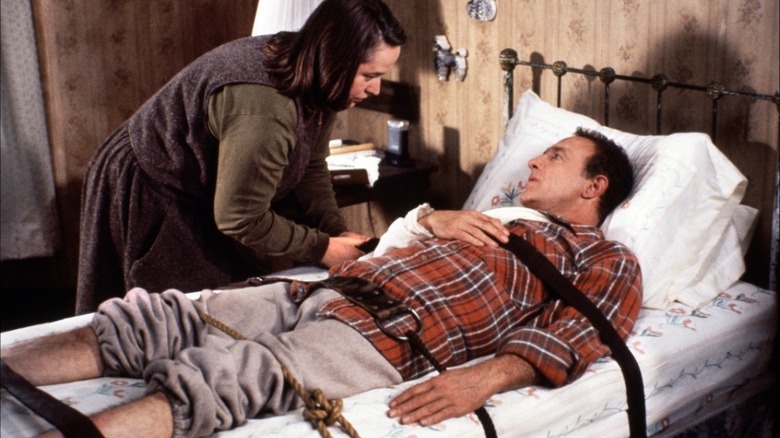There's Only One Stephen King Movie With An Oscar Win
As of this writing, there are about 85 films and TV shows to have been based on the written output of Stephen King, with many more in active development. King isn't just a prolific horror author and one of the most successful novelists of all time, but an entire cottage industry, serving as the driving force behind a sizable arm of the entertainment marketplace. He has been a ubiquitous part of Hollywood since 1976, when Brian De Palma adapted his novel "Carrie" to the big screen. "Carrie" was nominated for two Oscars. King's star only continued to rise when directors like Stanley Kubrick, John Carpenter, and David Cronenberg tackled the author's dark sensibilities.
For a decade, King was described as a master of horror, as his stories like "The Shining," "Christine," "The Dead Zone," "Creepshow," "Cujo," "Firestarter," and several others drew people in with their unique devotion to death and blood. King was a genre.
In 1986, however, King also proved that he could be wistful and nostalgic, as Rob Reiner adapted his novella "The Body" into the acclaimed coming-of-age drama "Stand By Me." Reiner's film was a smash success and was nominated for the Academy Award for Best Adapted Screenplay. Because of "Stand By Me," King was now a prestige author on top of being a horror machine.
Two other prestige King adaptation have been considered for Oscars since "Stand By Me." In 1994, "The Shawshank Redemption" was nominated for seven Oscars, including Best Picture. "The Green Mile" racked up four nominations in 1999, also including Best Picture.
None of the above nominations, however, produced any wins. "Carrie" similarly lost out on the Oscars it was nominated for, with "Stand By Me" losing out on the prize for Best Adapted Screenplay to "A Room With a View." Likewise, "Shawshank" notoriously lost in all seven of its nominated categories, while "The Green Mile" walked away empty-handed.
Indeed, only one Stephen King adaptation has won an Academy Award: Rob Reiner's "Misery," released in 1990.
Misery loves company
"Misery" was essentially King envisioning his own personal nightmare scenario. The main character is a Stephen King-like author named Paul Sheldon (James Caan) who has written a series of successful romance novels starring a character named Misery Chastain. The books have made him a famous millionaire, and he has superfans all over the world. While driving through a blizzard one night, Paul accidentally drives off the road and is horrendously injured. He is found by Annie Wilkes (Kathy Bates), a nurse who lives in a remote cabin in the woods. Annie takes him in and heals his wounds, revealing that she is his biggest fan. Curiously, her house has no telephones and is miles from where anyone can reach them.
Annie is also, Paul quickly realizes, mentally unbalanced. When she discovers that Misery Chastain dies in the latest novel, she cracks, forcing him to write a new book. She drugs him and berates him and threatens to kill him. She never told anyone that he's being kept in her home, so Paul is now trapped to do the bidding of his superfan. Annie demands he write new Misery books where the character comes back to life. When Paul tries to escape, Annie notoriously breaks his ankles.
Kathy Bates was nominated for Best Actress at the Academy Awards that year and won over Anjelica Huston in "The Grifters," Julia Roberts in "Pretty Woman," Meryl Streep in "Postcards from the Edge," and Joanna Woodward in "Mr. & Mrs. Bridge." In her acceptance speech, Bates playfully said she wanted to apologize publicly for the ankles scene. She also thanked Stephen King for dreaming up Annie Wilkes in the first place. One might hope that King enjoyed the gratitude, as he hasn't heard it from an Oscars podium since.
"Misery" was Bates' first Oscars attention, and she would go on to be nominated for Supporting Actress for "Primary Colors," "About Schmidt," and "Richard Jewell." King, meanwhile, will have to comfort himself with his millions of fans, his millions of dollars, his ubiquity in the horror community, his 109 writing awards, and 16 lifetime achievement recognitions.

